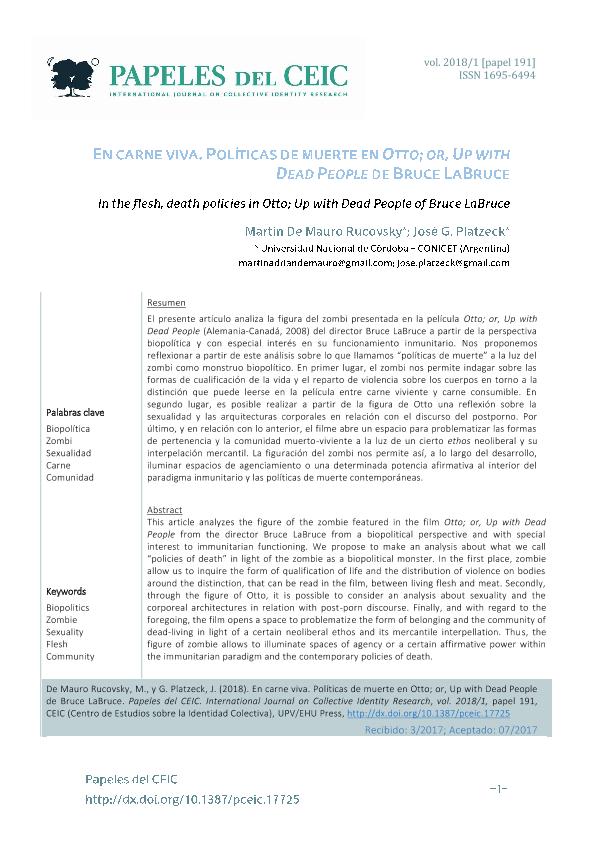Mostrar el registro sencillo del ítem
dc.contributor.author
de Mauro Rucovsky, Martin Adrian de Mauro

dc.contributor.author
Platzeck, José Gaston

dc.date.available
2020-02-03T17:46:55Z
dc.date.issued
2018-03
dc.identifier.citation
de Mauro Rucovsky, Martin Adrian de Mauro; Platzeck, José Gaston; En carne viva. Políticas de muerte en Otto; or Up with Dead People de Bruce LaBruce; Centro de Estudios sobre la Identidad Colectiva; Papeles del CEIC; 2018; 1; 3-2018; e191-e191
dc.identifier.issn
1695-6494
dc.identifier.uri
http://hdl.handle.net/11336/96539
dc.description.abstract
El presente artículo analiza la figura del zombi presentada en la película Otto; or, Up with Dead People (Alemania-Canadá, 2008) del director Bruce LaBruce a partir de la perspectiva biopolítica y con especial interés en su funcionamiento inmunitario. Nos proponemos reflexionar a partir de este análisis sobre lo que llamamos “políticas de muerte” a la luz del zombi como monstruo biopolítico. En primer lugar, el zombi nos permite indagar sobre las formas de cualificación de la vida y el reparto de violencia sobre los cuerpos en torno a la distinción que puede leerse en la película entre carne viviente y carne consumible. En segundo lugar, es posible realizar a partir de la figura de Otto una reflexión sobre la sexualidad y las arquitecturas corporales en relación con el discurso del postporno. Por último, y en relación con lo anterior, el filme abre un espacio para problematizar las formas de pertenencia y la comunidad muerto-viviente a la luz de un cierto ethos neoliberal y su interpelación mercantil. La figuración del zombi nos permite así, a lo largo del desarrollo, iluminar espacios de agenciamiento o una determinada potencia afirmativa al interior del paradigma inmunitario y las políticas de muerte contemporáneas.
dc.description.abstract
This article analyzes the figure of the zombie featured in the film Otto; or, Up with Dead People from the director Bruce LaBruce from a biopolitical perspective and with special interest to immunitarian functioning. We propose to make an analysis about what we call “policies of death” in light of the zombie as a biopolitical monster. In the first place, zombie allow us to inquire the form of qualification of life and the distribution of violence on bodies around the distinction, that can be read in the film, between living flesh and meat. Secondly, through the figure of Otto, it is possible to consider an analysis about sexuality and the corporeal architectures in relation with post-porn discourse. Finally, and with regard to the foregoing, the film opens a space to problematize the form of belonging and the community of dead-living in light of a certain neoliberal ethos and its mercantile interpellation. Thus, the figure of zombie allows to illuminate spaces of agency or a certain affirmative power within the immunitarian paradigm and the contemporary policies of death.
dc.format
application/pdf
dc.language.iso
spa
dc.publisher
Centro de Estudios sobre la Identidad Colectiva
dc.rights
info:eu-repo/semantics/openAccess
dc.rights.uri
https://creativecommons.org/licenses/by-nc-nd/2.5/ar/
dc.subject
BIOPOLÍTICA
dc.subject
SEXUALIDAD
dc.subject
ZOMBIE
dc.subject
COMUNIDAD
dc.subject
CARNE
dc.subject.classification
Otras Humanidades

dc.subject.classification
Otras Humanidades

dc.subject.classification
HUMANIDADES

dc.title
En carne viva. Políticas de muerte en Otto; or Up with Dead People de Bruce LaBruce
dc.title
In the flesh, death policies in Otto; Up with Dead People of Bruce LaBruce
dc.type
info:eu-repo/semantics/article
dc.type
info:ar-repo/semantics/artículo
dc.type
info:eu-repo/semantics/publishedVersion
dc.date.updated
2019-09-24T15:30:11Z
dc.journal.volume
2018
dc.journal.number
1
dc.journal.pagination
e191-e191
dc.journal.pais
España

dc.journal.ciudad
Valencia
dc.description.fil
Fil: de Mauro Rucovsky, Martin Adrian de Mauro. Universidad Nacional de Córdoba. Facultad de Filosofía y Humanidades. Centro de Investigaciones María Saleme Burnichón; Argentina. Consejo Nacional de Investigaciones Científicas y Técnicas. Centro Científico Tecnológico Conicet - Córdoba; Argentina
dc.description.fil
Fil: Platzeck, José Gaston. Consejo Nacional de Investigaciones Científicas y Técnicas. Centro Científico Tecnológico Conicet - Córdoba; Argentina. Universidad Nacional de Córdoba. Centro de Estudios Avanzados; Argentina
dc.journal.title
Papeles del CEIC
dc.relation.alternativeid
info:eu-repo/semantics/altIdentifier/url/http://www.ehu.eus/ojs/index.php/papelesCEIC/article/view/17725/17250
dc.relation.alternativeid
info:eu-repo/semantics/altIdentifier/url/https://www.ehu.eus/ojs/index.php/papelesCEIC/article/view/17725
dc.relation.alternativeid
info:eu-repo/semantics/altIdentifier/doi/https://doi.org/10.1387/pceic.17725
Archivos asociados
